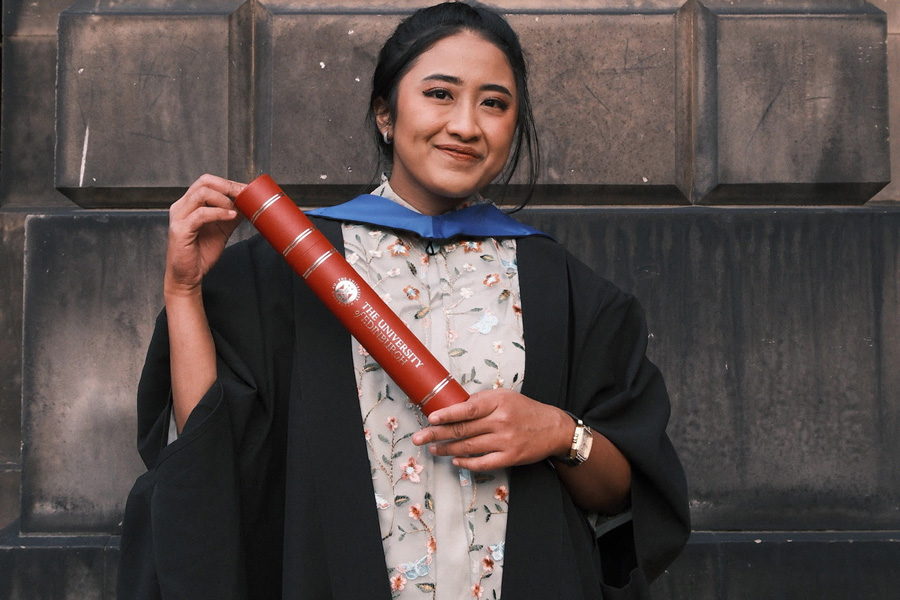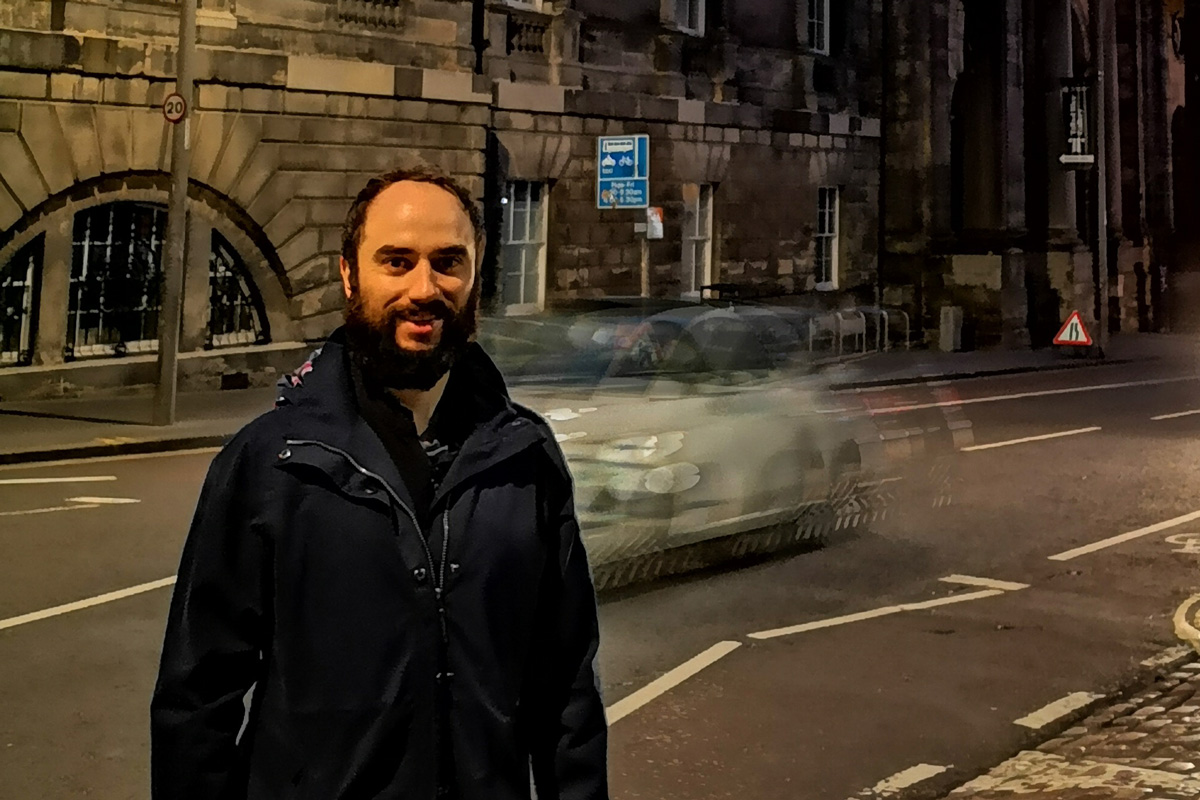LLM in Innovation, Technology and the Law
The LLM in Innovation, Technology and Law offers advanced study of a range of law and law-related subjects, which address the opportunities and risks posed by innovation and new technology.
The programme also offers an opportunity to develop more detailed knowledge, understanding and research skills in a chosen dissertation topic.
This unique degree programme explores the role of the law in regulating and promoting new and emerging technologies. The courses on offer will enable you to examine the legal, ethical and regulatory issues in fields such as:
- artificial intelligence
- biotechnology
- data protection
- information technology
- intellectual property
- online media and social media platforms
- medical sciences
- space law
The core subjects of the degree provide in-depth knowledge of domains where law engages with technology, laying the foundations for a specialised dissertation.
By the end of your studies will have acquired a sophisticated awareness of the problems that arise in the field of law and technology and the differing approaches to their solution.

The University of Edinburgh is the perfect blend of tradition and advanced academic excellence. I always knew this was where I wanted to be.
Digital technologies are increasingly becoming a ubiquitous part of the world we live in. Technological development brings about change at a pace that was unfathomable just a few years ago, and this involves every aspect of our daily lives and our societies:
- the way we communicate;
- the way business transactions are concluded;
- the way the media operate;
- the way artificial intelligence replaces human beings in the workplace and beyond;
- the way personal data is shared, and much more.
As law-makers and regulators around the world strive to grapple with on-going changes, this programme offers a unique opportunity to engage with contemporary questions surrounding the law and policy that govern innovation processes, combining together diverse perspectives from a range of cutting-edge courses.
By the end of your studies for this degree, you will have acquired a sophisticated awareness of the problems that arise in the field of law and technology and the differing approaches to their solution. The degree will also enhance career prospects in the legal profession, in regulatory bodies at the international and domestic level, third sector organisations and within media, IT and creative industries.
Staff on the Innovation, Technology and the Law Programme explore the risks and opportunities created by technological innovation for individuals and society more generally.
Dr Lachlan Urquhart’s research considers how we can build ethical frameworks into artificial intelligence systems, with projects designed to enhance the trustworthy nature of robotic systems, eg drones; to analyse the ethics of affective computing use in smart cities in Japan and the UK; and to develop an internet device that can help dementia sufferers manage identity and memories.
Professor Burkhard Schafer’s research also focuses on the ethics of emerging technologies, with a specific interest in how technology influences the development and application of the law.
Nicolas Jondet’s research interests lie in the field of privacy, information control, and the regulation of new technologies such as blockchain; while Drs Paolo Cavaliere and Rachael Craufurd Smith have worked together to represent the UK on the EU Media Pluralism Monitor. Dr Cavaliere’s research focuses on issues surrounding freedom of expression and digital platforms, while Dr Craufurd Smith has particular interests in media ethics and regulation, media concentration and transparency, and the regulation of commercial speech.
Throughout each academic year, a number of prominent experts from both academic and professional backgrounds come and deliver talks and seminars, and generally engage with our student and research community. Speakers invited over the last few years included prominent scholars from the universities of Oxford, Cambridge, Leuven, Penn State and Queensland among others.
Contact us
If you have any questions about the LLM in Innovation, Technology and the Law please don't hesitate to contact us.
This programme can be taken full-time over one year, or part-time over two years subject to visa restrictions. It offers a range of courses from the fields of technology, communications, IP and medical law with an international perspective, giving you the option to tailor the programme to suit your needs and interests.
The programme consists of 180 credits, comprising taught courses worth 120 credits (60 credits per semester) and a 10,000 word dissertation worth 60 credits.
An illustrative list of the courses that may be offered in the 2026-27 academic year can be found below. Please note that not all of the courses listed will be offered and these will be confirmed in May 2026.

Edinburgh Law School broadened my technology law standpoint through strong academic support and genuine freedom of thought.
You must select between 80 and 120 credits of the following courses:
- Information: Control and Power (20 credits)
This course will investigate, through a range of legal disciplines and perspectives, the growing focus placed on, and value attached to, information by society, governments, businesses and individuals; concerns as to its control and misuse; and the impact of this on all stakeholder, particularly in the light of the opportunities and challenges of evolving and converging - technologies.
- International and European Media Law (20 credits)
This course will examine the impact of International and European law on, firstly, the structure of media markets and, secondly, the content of media services. The course will start with a discussion of the nature of the media, the media 'value chain', and the relationship between media freedom, freedom of expression and other human rights. It will examine the various international organisations competent in the media field and the regulatory strategies that are being adopted to deal with media convergence and globalisation. In relation to structural matters, consideration will be given to consolidation of media ownership and state funding of the media, in particular public service broadcasting. In relation to content controls, the course will examine attempts to create a more equitable flow of media content and concerns over 'media imperialism', the regulatory problems posed by pornography and hate speech and the balance to be struck between freedom of the media and privacy. Robotics, AI and the Law (20 credits)
The course introduces you to the legal and wider regulatory issues raised by the increasing use of automated and autonomous devices. As we increasingly allow machines to make decisions for us, this raises significant problems for our legal concepts of liability, responsibility legal personhood.In addition to gaining a deeper understanding of the specific legal issues that are created by a number of particularly important applications of robotics and autonomous agent technology, you will also acquire a generic understanding of the types of problems that are raised by autonomous technologies for the theory of regulation. You will gain an understanding of the limits of regulation by law and the ability to evaluate comparatively other modes of regulation for a given problem.
- Legal Technology and the Justice System (20 credits)
Artificial Intelligence has the potential to change the way law operates - and with that also the future of the law firm. Some commentators, prominent amongst them Richard Susskind, have anticipated for decades major changes in the 'value chain' that law firms produce. This course introduces key technologies that have the potential to impact on the way lawyers operate in practice, with a focus on the issue of digital evidence and computer forensics.
- Outer Space Law and Policy (20 credits)
The course will explore the five main UN treaties relating to space (Outer Space 1967, Rescue Agreement 1968, Liability Convention 1972, Registration Agreement 1975 and Moon Agreement 1979) and their continuing relevance to recent developments in the field of space exploration and use. In addition, each seminar will address a specific development or challenge in regulating space such as human space flight, the peaceful uses of space, remote sensing, sustainable uses of space and space communications. It will also explore the interface between international law, regional initiatives and domestic law.
- Software and the Law (20 credits)
This course will examine how software is generated, protected and commercialised. It will explore the intellectual property protection afforded to software via copyright, patents or trade secrets. It will also explore more complex issues of ownership, such as in the employment context or when AI is used to generate software. The course will explore the requirements imposed on software development with respect to data protection and information security. It will also look at liability issues for software providers and risk assessments and classification of software using AI. Lastly, the course will explore competition law issues relevant to software marketplaces, the definition and compliance with interoperability requirements as well as technical standardisation
- EU Data Protection Law (GDPR) (20 credits)
The purpose of this course is to consider the European Union's (EU) data protection framework as set out in the General Data Protection Regulation (GDPR). The last decade has seen a heightened awareness of data protection and privacy issues, largely brought about by the development of new technologies and business models that rely heavily on the use of personal data. We are now operating in a world where our everyday life is increasingly dominated by 'smart' devices, apps, online platforms and AI systems, and the EU is often seen as leading the global effort in regulating this new data and technology-driven environment. This course will consider whether or not data protection laws are appropriate to cope with the pressures that developments in technology are bringing. It will focus on the principles at the heart of data protection law and examine their application to specific settings. It will also consider the impact the GDPR has already had on the global data protection landscape.
- Decentralised Technologies: Law, Finance and Society (20 credits)
The purpose of this course is to consider the European Union's (EU) data protection framework as set out in the General Data Protection Regulation (GDPR). The last decade has seen a heightened awareness of data protection and privacy issues, largely brought about by the development of new technologies and business models that rely heavily on the use of personal data. We are now operating in a world where our everyday life is increasingly dominated by 'smart' devices, apps, online platforms and AI systems, and the EU is often seen as leading the global effort in regulating this new data and technology-driven environment. This course will consider whether or not data protection laws are appropriate to cope with the pressures that developments in technology are bringing. It will focus on the principles at the heart of data protection law and examine their application to specific settings. It will also consider the impact the GDPR has already had on the global data protection landscape.
- Hardware and the Law: Intellectual Property, Safety, Sustainability and Sovereignty for Tech Devices (20 credits)
The course explores the regulatory frameworks applicable to innovative technical devices such as computer microchips, solar panels, batteries or medical implants. The aim is to engage with all the legal and regulatory protections and obligations relevant to the financing, invention, deployment and commercialisation of such tech devices.
- The Legal Challenges of Information Technologies (20 credits)
This course introduces you to key issues in the fast-paced area of technology law. We will consider a wide variety of hard regulatory questions posed by impacts of emerging information technologies. These systems are often changing, adapting, and shifting, meaning regulation in this domain does too. This creates a policy and legal landscape that is often in a state of flux but also gives us a wide range of case studies, examples, and legal frameworks to consider in this course.
Each week we will explore and analyse interesting questions about the socio-technical risks and harms posed by specific new technologies, the merits and demerits of different regulatory strategies, and the role law plays in shaping how these technologies impact our everyday lives.
- E-Governance, Digital Change and Democratisation (20 credits)
What is the shape of democracy in the 21st Century? Digital technologies are already impacting virtually every aspect of public life, from high-level decision-making in political spheres to the way local authorities deliver public services; from supporting the delivery of essential services to harnessing the potential of technological innovation to bridge the digital divide and promote economic development
- Human-Computer Interaction and Governance (20 credits)
Technology law students increasingly need higher levels of understanding of computing, and this course explores a domain of computer science called human-computer interaction (HCI). It questions what lessons we can learn from this field for technology law and governance. This course presents a range of methodological and substantive topics to broaden law students' skill sets beyond traditional legal modes of inquiry. This is complemented by utilising novel use cases of cutting-edge technologies to ground class discussions in emerging real life governance problems. We will also reflect on practices of designers and what opportunities there are for addressing legal, cultural, design and social harms in their work.
- Contemporary Issues in the Law and Policy of E-Commerce, the Digital Economy and International Information Governance (20 credits)
This course addresses some of the most topical and current issues in national and international responses to new disruptive business models. It also addresses issues of international governance of technology. It responds flexibly to the latest international developments at the intersection of law, the economy and technology, identifying challenges to current legal regimes in emerging fields of technology, where the law is either not yet settled, or not any longer achieving its purpose.
- Legal and Ethical Issues in Digital Journalism (20 credits)
- The Law of Advertising and Commercial Speech (20 credits)
You will be introduced to the role of law and regulation relating to advertising and commercial speech and encouraged to think critically about the social, political and economic impact of advertising and the role of law in shaping this field. We will explore the human rights dimension and the public and private interests that underpin advertising law and regulation. The course will also consider the interplay of self-regulation and statutory regulation and the role of EU law in shaping domestic rules. You will also be encouraged to think about how rules are enforced and jurisdiction in an increasingly integrated international marketplace.
You will have the option to take between 0 and 40 credits of the following courses from different subject areas offered by the Law School, depending on availability and with the express permission of the Programme Director.
- Intellectual Property Law 2: Industrial Property (20 credits)
- Surveillance and Security (20 credits)
- Fundamental Issues in Medical Jurisprudence (20 credits)
- Contemporary Issues in Medical Jurisprudence (20 credits)
- Cybercrime and Cyber Security (20 credits)
- Ethics of Health Technologies (20 credits)
- Introduction to Health Law Reproduction and the Law (20 credits)
- End of Life, Ethics and Law (20 credits)
- Shaping and Regulating Modern Healthcare (10 credits)
- Clinical Negligence and the Law (10 credits)
- Advanced Issues in Patent Law and Policy (20 credits)
- Comparative Statutory Interpretation (20 credits)
- Competition Law, Intellectual Property & the Innovation Economy (20 credits)
- Current Issues in the Case Law of the European Court of Human Rights (20 credits)
- Fundamentals of Comparative Private Law (20 credits)
- Fundamentals of EU Competition Law 1 (20 credits)
- Fundamentals of EU Competition Law 2 (20 credits)
- Fundamentals of Legal Argument (20 credits)
- General Principles of Criminal Law (20 credits)
- Human Rights Law and Armed Conflict (20 credits)
- Intellectual Property Law, Innovation and Creativity (20 credits)
- International Climate Change Law (20 credits)
- International Environmental Law (40 credits)
- International Human Rights Law (20 credits)
- Law and Development (20 credits)
- Reasoning with Precedent (20 credits)
- Sustainability in Food Supply Chains: Law and Policy (20 credits)
- Sustainable Finance and the Law (20 credits)
- The Law of Integration: understanding the EU Legal System (20 credits)
- The Rule of Law (20 credits)
Having successfully completed 120 credit points of courses within the LLM, you will be ready to move onto a single piece of independent and in-depth research. The 10,000 word dissertation allows you to focus on a preferred topic from within the field of innovation, technology and the law, normally based on a subject you have studied in one of your courses during the programme.
You are supported with your independent research in several ways:
- During semester 2 (Jan – March) you are provided with targeted opportunities to develop research and writing skills necessary for the successful completion of a larger research project.
- You receive advice on formulating an appropriate research topic and feedback on developing a specific research question.
- You are assigned an academic supervisor who will provide you with support and guidance while you undertake your research. You will have three meetings with your supervisor (in the period April – June, following the end of taught courses) in which avenues of research are discussed; a structure for the dissertation is developed; and feedback is provided on a sample of the dissertation. The dissertation is submitted in August.
This independent research project is a challenging but rewarding endeavour, allowing you to demonstrate a comprehensive grasp of the relevant literature and an ability to engage critically with a range of sources, drawing on the skills and knowledge you have developed during your studies. You are encouraged to show originality and evidence of independent thinking. Indeed, the outcome of the project – your dissertation – may provide a useful platform for the next stage of your career.
Please note that due to unforeseen circumstances or lack of demand for particular courses, we may not be able to run all courses as advertised come the start of the academic year.
Contact us
If you have any questions about the LLM in Innovation, Technology and the Law please don't hesitate to contact us.
Staff teaching on the core courses for the LLM in Innovation, Technology and the Law for 2025-26 are experts in their field and are actively involved in cutting-edge research in various legal fields including media law, regulation of new technologies, IT law, IP law, and medical law and ethics.
Dr Rachael Craufurd Smith - Programme Director 2025-26
Rachael Craufurd Smith is a Reader in Media and EU Law specialising in international and European media law and regulation, with a particular interest in the future of public service media, free speech and media responsibility, and the protection of cultural heritage. She completed her doctorate at the European University Institute, Florence, and previously worked as a solicitor at the London law firm Payne Hicks Beech, at the International and Policy and Planning Departments of the BBC, and as a Fellow for a number of years at Trinity and Corpus Christi Colleges and a University Lecturer at the University of Oxford.
Burkhard is Professor of Computational Legal Theory and Director of the SCRIPT Centre for IT and IP law. His main field of interest is the interaction between law, science and computer technology, especially computer linguistics. How can law, understood as a system, communicate with systems external to it, be it the law of other countries (comparative law and its methodology) or science (evidence, proof and trial process). He is currently working mainly on issues such as privacy compliant software architecture and more generally the scope and limits of representing legal concepts directly in the internet infrastructure.
Morshed Mannan joined Edinburgh Law School on 1 November 2024 as a Lecturer in Global Law and Digital Technology. He was previously a postdoctoral Research Fellow at the Robert Schuman Centre for Advanced Studies at the European University Institute, where he was part of the ‘BlockchainGov’ ERC project led by Dr. Primavera de Filippi. His research focuses on blockchain governance and cooperative governance. He received his Ph.D. from Leiden Law School, Leiden University in 2022 for his dissertation entitled: The Emergence of Democratic Firms in the Platform Economy: Drivers, Obstacles and the Path Ahead.
Judith Rauhofer is a Lecturer in IT Law and an Associate Director of the Centre for Studies of Intellectual Property and Technology Law (SCRIPT). Her research interests include the commercial and fundamental rights aspects of online privacy and electronic surveillance, data protection, information security and all areas of e-commerce and internet law and policy. Judith is particularly interested in exploring the tensions between privacy as an individual right and as a common good.
Paolo will be on sabbatical for the 2025-26 academic year
Paolo Cavaliere joined the Law School from September 2014 as a lecturer in Digital Media and IT Law. Prior to joining the School, Paolo has been a researcher at the Programme in Comparative Media Law and Policies of the Centre for Socio-Legal Studies of the University of Oxford where he has also helped to coordinate the Monroe Price Media Law Moot Court Competition. His main interests in research include the discipline of pluralism and diversity in the media, e-democracy and the relationship between new media and politics, regulation of audiovisual industries and digital media. He has written about different aspects of Media law, including “mediacracy” and the democratic deficit of the EU; media pluralism in the European sphere; digital technologies and the political debate in the public sphere.
Lachlan will be on sabbatical for the 2025-26 academic year
Lachlan is a Lecturer in Technology Law at the University of Edinburgh. He is also a visiting researcher at the Horizon Digital Economy Research Institute, where he was a Research Fellow in Information Technology Law from 2016-2018.
Lachlan's primarily works at the boundaries of computer science (human-computer interaction), information technology law (mainly privacy and information security), and computer ethics. He focusses extensively on the technical, socio-legal, sociological, and ethical implications of living with interactive computing (e.g. Ubicomp/Internet of Things, robotics, smart homes & cities, social media etc.).
The staff teaching on this programme are subject to change for 2026-27 academic year. Staff listed as on sabbatical will not be available to teach for the duration of their sabbatical.
Contact us
If you have any questions about the LLM in Innovation, Technology and the Law please don't hesitate to contact us.
Find out what it's like to study for an LLM in Innovation, Technology and the Law at Edinburgh Law School from our current and former students.
During my undergraduate studies, AI Technologies were rapidly developing and used for business and research purposes. At that time, clear technology legal frameworks were still lacking and many people were unfamiliar with the ethical and legal limits of such technologies. This raised growing concerns around intellectual property, the originality of work, and the extensive use of personal data without proper regulatory safeguards. These issues motivated me to pursue the LLM in Innovation, Technology, and The Law, one of the programmes that explores how the law should respond to technological advancement. Edinburgh Law School offered the viewpoints that I was looking for.

Throughout seminars, I felt safe in expressing my opinions within an academic scope. I also received constructive feedback from lecturers and external examiners that were both detailed and objective which helped me to develop my legal research skills. Beyond lessons, the School provides many opportunities related to research, competitions, and international conferences which ensures students gain beneficial experiences outside formal study.
I have a strong bond with the international cohort. Our relationship goes beyond professional networking, we regularly exchange perspectives from different legal systems, support one another academically, and maintain our connections through monthly social catch-ups to create a reassuring environment.
Studying in Edinburgh is often described as my fairytale student journey. The stunning and charming old city vibes made my experience even more special and memorable.
Kai studied the LLM in Innovation, Technology and the Law in the 2024-25 academic year, graduating in 2025.
Sundaresan studied the LLM in Innovation, Technology and the Law in the 2024-25 academic year, graduating in 2025.
I would sum up my time at Edinburgh as simply magical. Studying in a city known for its stunning architecture and breathtaking landscapes was an enriching experience, made even more special by the opportunity to learn from some of the finest minds in Innovation and Technology Law.

From my undergraduate days, I have always been fascinated by emerging technologies and how legal systems adapt to regulate and integrate them. Exploring this evolving intersection of law and technology is what drew me to pursue this specialisation.
The University of Edinburgh was always my first choice, a perfect blend of tradition and forward-looking academic excellence that reflected the nature of the field itself. The programme expanded my understanding through exposure to diverse perspectives across different jurisdictions and legal traditions, deepening my appreciation of comparative jurisprudence.
Engaging lectures, stimulating discussions, and the unwavering guidance of dedicated faculty consistently broadened my intellectual horizons. Equally meaningful were my cohort mates, who soon became friends and invaluable collaborators from whom I learned a great deal both inside and outside the classroom.
Overall, my experience was academically transformative and personally enriching. I am immensely proud to be a graduate of the University of Edinburgh , a place that will always hold a special place in my heart.
Aline, from Brazil, studied for an LLM in Innovation, Technology and the Law in the 2021/22 academic year, graduating in 2022. In this video she talks about her experience of studying for an LLM at Edinburgh Law School, life in Edinburgh and her plans for the future.
Heidimaria studied the LLM in Innovation, Technology and the Law, graduating in 2022.
"The University of Edinburgh is one of the world’s most prestigious cradles of knowledge and students become a part of international community that extends far beyond their time in Scotland. The Innovation, Technology and the Law LL.M. programme gave me insight into contemporary legal challenges related to data protection, IPR, AI, Web3 and robotics, to name few.

The professors provided an endless source of inspiration, and the staff were committed to supporting students’ journeys. A word of warning for those with a curious mind and burning desire to always learn more, the myriad of studying materials might make you feel like a child in a candy shop!
Scotland is truly magical, a combination of vibrant urban life, gorgeous architecture, Scottish bagpipes, heart-warmingly friendly people, and nature that takes your breath away. My year at the University of Edinburgh constituted a unique, once in a lifetime experience I will never forget!"

After finishing my law studies in Germany, I wanted to embark on a new adventure and decided to do the Master’s degree in Innovation, Technology and the Law in Edinburgh. The programme and the courses it offers is unique within Europe, but also world-wide. The professors are very motivated and always up to date in the rapidly evolving tech and media world. Their enthusiasm quickly jumps to you and the discussions in class were very lively and enriching.
Before coming to Scotland, I knew little about Edinburgh and the country itself, but on various road trips I got to experience the Scottish nature and mentality and fell in love with it! Edinburgh is such a beautiful city with many little streets, cafes and pubs to discover and enjoy. Even though our experience was cut short due to COVID-19, the master’s degree was one of the best decisions in my life.
Frauke studied the LLM in Innovation, Technology and the Law in the academic year 2019-20, graduating in 2020.
As a Chilean lawyer, the LLM in Innovation, Technology and the Law of Edinburgh Law School perfectly fitted my expectations in various ways. First, for its flexibility, as courses outside the program may be attended by students. Second, its structure consists of a variety of cutting-edge courses, allowing students to get involved with a wide range of topics according to their own interests (data protection, AI, information technology, robotics, media law, among many others). Third, top of the line lecturers, with notable practical and academic backgrounds.

Finally, the program requires students to develop high quality analyses and approaches to unresolved legal challenges, demanding serious study and development of our relevant research skills.
Along with the above, the chance to complement such an intense and extraordinary academic experience in Edinburgh, one of the best quality life cities of the world, just made the perfect match for an unforgettable year.
Jorge studied the LLM in Innovation, Technology and the Law in the academic year 2019-20, graduating in 2020.
The University of Edinburgh offers a great experience and a chance to meet students from all over the world. Remarkably, it has a well-sorted library system. I could access many books and articles online, which was very helpful during Corona restrictions. The professors and staff are amiable and were always there if I needed advice or guidance. I would like to take this opportunity to sincerely thank all of you. The city of Edinburgh itself was a joy to explore and is one of my favourite cities now.

The program ‘Innovation, Technology and the Law’ was exciting and provided a lot of insight into different fields of law relevant to the regulation of new technologies. I recommend everyone to visit the open day to get a good impression of what expects you.
Sophia studied the LLM in Innovation, Technology and the Law in the academic year 2019-20, graduating in 2020.
Niovi, a student from Greece, studied the LLM in Innovation Technology and the Law at Edinburgh Law School in the 2019/20 academic year. In this video she talks about her experiences on the LLM and living in Edinburgh.
"As one of few prominent law schools offering a technology-related program, it provides an uncontested platform to gain a better understanding of the legal aspects of technology applications – including E-commerce, artificial intelligence, and big data – many of which are unregulated or under-regulated. The valuable insights on how to take legal approaches to it, is a forte of this program.

Contact us
If you have any questions about the LLM in Innovation, Technology and the Law please don't hesitate to contact us.
Please note that the information provided is for entry in the 2026-27 academic year and requirements for future academic years may differ.
This programme can be taken full time over one year, or part time over two years subject to visa restrictions.
Due to high demand, the school operates a number of selection deadlines. We will make a small number of offers to the most outstanding candidates on an ongoing basis, but hold the majority of applications until the next published selection deadline when we will offer a proportion of the places available to applicants selected through a competitive process.
We recommend that you apply as early as possible. This is particularly important for applicants who may need to allow sufficient time to take an English language test, for overseas students who may need time to satisfy necessary visa requirements and/or to apply for University accommodation.
Apply for September 2026 entryWe require a minimum 2:1 honours degree from a UK university, or its international equivalent, in law. We may also consider a UK 2:1 honours degree, or its international equivalent, in a social science subject. Entry to this programme is competitive. Meeting minimum requirements for consideration does not guarantee an offer of study.
Supporting your application
- Relevant work experience is not required but may increase your chances of acceptance.
- Relevant professional qualifications will be considered.
- Preference will be given to those with grades above the minimum requirements due to strong competition for places on this programme.
International qualifications
You can check whether your degree qualification is equivalent to the minimum standard before applying.
Students from China
This degree is Band A.
Find out more about our postgraduate entry requirements for students from China
Postgraduate study in the field of law requires a thorough, complex and demanding knowledge of English, so we ask that the communication skills of all students are at the same minimum standard.
You must demonstrate a level of English language competency at a level that will enable you to succeed in your studies, regardless of your nationality or country of residence.
If you have already met our English language entry requirements for your programme at the time you apply, your application may be considered more competitive in selection than applications where you still need to take an English language test.
English language tests
We accept the following English language qualifications at the grades specified:
Two year expiry
- IELTS Academic / IELTS Academic for UKVI and IELTS Academic Online: total 7.0 (at least 7.0 in the writing component and 6.5 in each other module)
- TOEFL-iBT (including Home Edition): total 100 (at least 25 in writing and 23 in each other module)
- Trinity ISE: ISE III with a pass in all four components
- Oxford ELLT (Global and Digital): 8 overall with at least 8 in the writing component and 7 in each other component
Three and a half year expiry
- C1 Advanced, formerly known as Cambridge English: Advanced (CAE): 185 (at least 185 in writing and at least 176 in the other modules)
- C2 Proficiency, formerly known as Cambridge English: Proficiency (CPE): 185 (at least 185 in writing and at least 176 in the other modules)
Your English language qualification must be no more than two years old from the start of the month in which the programme you are applying to study begins, unless you are using CAE/CPE, in which case it must be no more than three and a half years old on the first of the month in which the degree begins.
Degrees taught and assessed in English
We also accept an undergraduate or postgraduate degree, that has been taught and assessed in English, either:
- In a majority English speaking country, as defined by UK Visas & Immigration (UKVI).
UKVI Majority English speaking countries
or
- On our list of approved universities in non-majority English speaking countries.
Approved universities in non-majority English speaking countries
If you are not a national of a majority English speaking country, then your degree must be no more than five years old at the start of the month in which your programme of study begins.
Full details of the University's English language requirements are available on the University's website
Visit the University's English language requirements web page to find out more
Pre-sessional English for Academic Purposes
We also accept satisfactory completion of our English for Academic Purposes programme as meeting our English language requirements. You must complete the programme no more than two years and one month before the start date of the degree you are applying to study.
Find out more about the University's Pre-sessional English for Academic Purposes
Your application may not be successful if you do not currently satisfy any of these requirements; alternatively, you may be offered a place conditional on your reaching the satisfactory standard by the time you start the degree.
English language support
The University runs a series of programmes for English Language Education, including a pre-sessional English Language Programme intended to strengthen your English Language skills before you start your programme of study.
Find out more about English language support offered by the University
Due to high demand, this programme operates a gathered field approach to admissions, with two application deadlines as noted below.
Each application round has a decision deadline, also listed below, but note that we will make as many offers as possible to the strongest candidates on an ongoing basis, in advance of the published decision deadline. We strongly recommend that you apply as early as possible, especially if you intend to apply for funding or a visa. Applications may close earlier than published deadlines if there is exceptionally high demand. If you are considering applying for our pre-sessional English Language programme, please make sure you apply in Round 1.
Please note that for an application to be reviewed, it must be a complete application by the application deadline with all supporting documentation uploaded, including your transcripts. If you already have evidence that you meet the English language entry requirements, such as via an approved English language test, please upload this evidence at the time of your application. If you have not already met your English language requirements, we will still review your application and issue a decision providing it is otherwise complete.
Selection deadlines
| Round | Application deadline | Decisions by |
|---|---|---|
| 1 | 15 December 2025 | 19 March 2026 |
| 2 | 04 May 2026 | 30 June 2026 |
After Round 2, if there are still places available, applications will remain open. As this is not guaranteed, however, you are advised to apply by the application deadlines above.
Please note that the deadline for meeting the conditions of an offer is 14 August 2026.
Applications are made online via the University Application Service, EUCLID.
Please follow the instructions carefully and make sure that you have included the following documentation with your application:
- You will need to submit a personal statement of around 500 words, outlining your academic history and relevant experience.
Guidance on writing your personal statement. - If you have any other relevant experience, for example paid or voluntary work experience or additional qualifications not stated elsewhere, then please include this information in your personal statement, or you can add it to the “Relevant knowledge/training skills” field in the application form.
- Degree certificates showing award of degree.
- Previous academic transcripts for all past degree programmes (please upload the full transcript showing results from all years of study). If you haven’t yet graduated, you may be asked to upload an interim transcript for any degrees that you are currently studying.
- Evidence of English language proficiency, if required.
If you are currently studying for your degree or you are not in a possession of an English test result you may still apply to the programme. Please note that it is your responsibility to submit the necessary documents.
Please be aware that applications must be submitted and complete, i.e. all required documents uploaded, by the relevant application deadline in order to be considered in that round. Your application will still be considered if you have not yet met the English language requirement for the programme.
Students at this University must not undertake any other concurrent credit bearing studies in this (or in any other) institution, unless the College has granted permission. The College must be satisfied that any additional credit-bearing studies will not restrict the student’s ability to complete their existing programme of study. Students will not be permitted to undertake concurrent degree programmes in any circumstances.
If you are studying at this or another institution just prior to the start of your postgraduate studies you must have finished these studies before the start of the programme to which you have an offer.
After your application has been submitted you will be able to track its progress through the University's applicant hub.
Application processing times will vary, however the admissions team will endeavour to process your application within four to six weeks of submission. Please note that missing documentation will delay the application process.
You will be informed as soon as possible of the decision taken. Three outcomes are possible:
- You may be offered a place unconditionally
- You may be offered a conditional place, which means that you must fulfil certain conditions that will be specified in the offer letter. Where a conditional offer is made, it is your responsibility to inform the College Postgraduate Office when you have fulfilled the requirements set out.
Please note that the deadline for meeting the conditions of an offer is 14 August 2026. - Your application may be unsuccessful. If your application has not been successful, you can request feedback from us or refer to our guidance for unsuccessful applicants, which explains some of the common reasons we why we reach this decision.
View the University's guidance for unsuccessful applicants
Deferring your offer
We do not normally offer deferrals, however, we may be able to make a very limited number of offers for deferred entry in exceptional circumstances.
If you receive an offer of admission, either unconditional or conditional, you will be asked to pay a tuition fee deposit of £1,500 (within 28 days of receiving your offer) to secure your place on the programme.
The University’s terms and conditions form part of your contract with the University, and you should read them, and our data protection policy, carefully before applying.
Contact us
If you have any questions about applying to the LLM in Innovation, Technology and the Law please don't hesitate to contact us.


